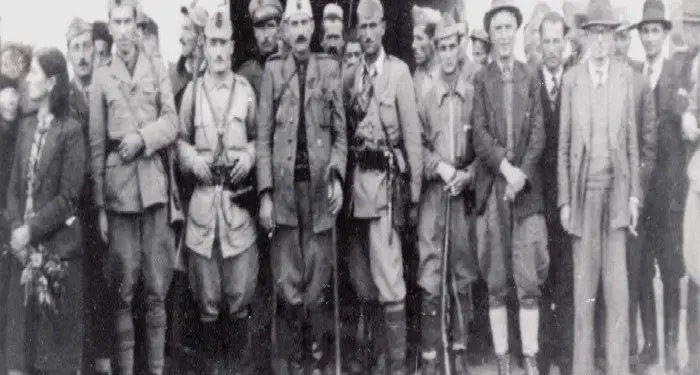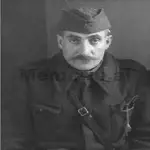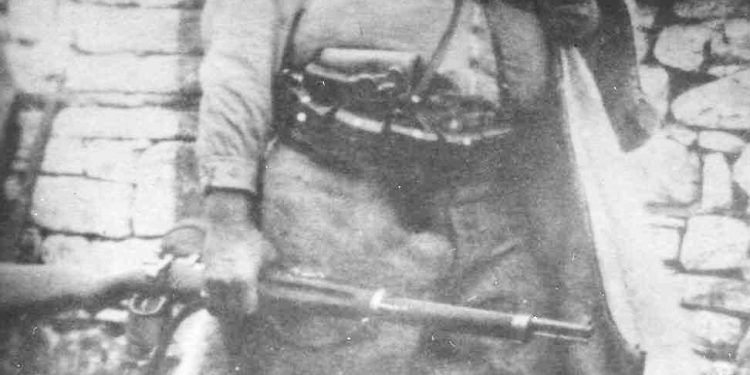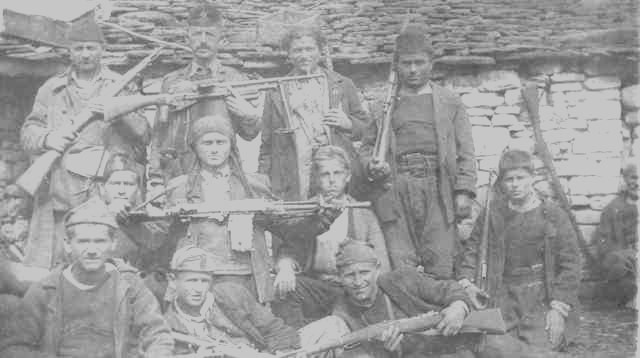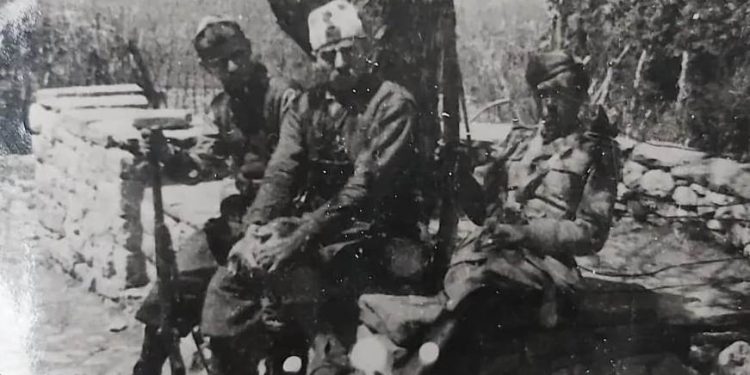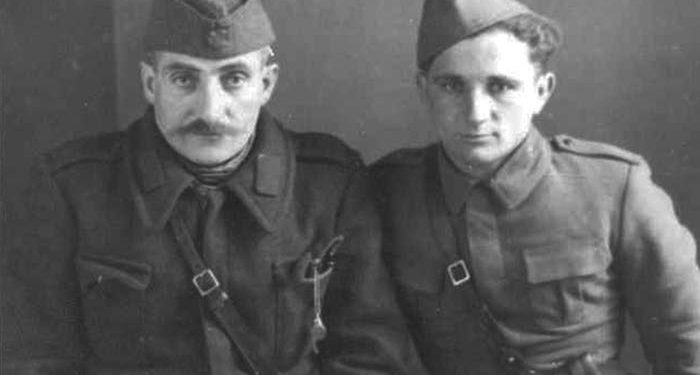By Zylyftar Hoxha
Memorie.al / Although 72 years have passed since the creation and the commemoration of the 72nd anniversary of the First Cheta of Skrapari, known to the people as “Çeta Plakë” or “Çeta e Mestan Ujanikut,” the name of the commander, the most popular figure, “the legend of the mountains of Skrapar,” as the international press wrote at that time, is not mentioned. A misunderstanding and prejudice from the previous regime severely punished this mountain man, so harshly that he lost his life in the prisons of the communist regime. To learn more about what has been and is being done for the rehabilitation of this distinguished warrior, we interviewed one of the descendants of the Ujanik family, Mestan’s nephew, Kujtim Musabelliu (Ujaniku), who resides in Florida, USA:
Mr. Ujaniku, you have come from the USA, where you have lived for several years and, as you have told us, with a program to restore the honor and dignity of your grandfather?
To be true and sincere, for me, the figure of the captain of the mountains of Skrapar, Mestan Ujaniku, in a way, has now been rehabilitated. To restore the honor and name of the heroic commander, the former President of the Republic, Alfred Moisiu, whom I thank on this occasion, has awarded him the high decoration “Shqiponja e Artë” (Golden Eagle). Recently, veteran Dule Kalemi published the monograph “Mestan Ujaniku, the Legend of the Mountains of Skrapar.”
However, despite all these recognitions, Mestan Ujaniku deserves more. He is an unqualified martyr, with no grave. We, his family members, when commemorative celebrations for the War occur, do not know where to place a bouquet of flowers in honor, there is no grave, no sign. This concern has brought me from America to see that, on the occasion of the 70th anniversary of the Liberation of the Homeland, something should be done.
And was it done?
Absolutely nothing. A bust in the city of Çorovodë, which Mestani liberated back in 1942, and a street or institution named in the city of Berat, where he operated until the liberation of Albania, would honor not only this warrior but would also do honor to those who venerate and respect him. The mayor of the city of Çorovodë, Nesim Spahiu, as he told us and tried, had the desire, but no funds were found…!?
A documentary that started with the initiative of some creators was left unfinished due to lack of money…! The Cultural Patriotic Association “Tomorri,” to carry out a very small and modest activity, required funds. Family members could do something, but as much as they could and as it falls to them, because they were also persecuted. And when I say this, I believe you understand me; everyone has been manual workers.
This is precisely the reason that I have been here for 8 months, but, in conclusion, I was disappointed because I couldn’t do anything, neither to find his grave, nor to make a symbolic grave in the ‘Martyrs’ Cemetery,’ where there are also his comrades, nor to receive compensation as a persecuted person, which they do not give, since supposedly he died in prison from natural causes (natural causes from torture)! Let alone for a bust, as we said above, for the name of an institution or street, there is no question. So please, don’t bother me anymore…!
Let’s move on to another aspect, your connections with your grandfather?
I am the son of Xhemali, the eldest son of Mestan, the commander of the second Cheta of Skrapar, who, after its expansion, separated from that of Mestan Ujaniku. I want to state on this occasion that after our homes in Ujanik were burned by Xhaf Bali in August 1942, our entire family became partisan because they had nowhere to stay. Xhemali, Hetemi, and Vehapi were with “the old man”; the youngest, Nuriu, was small and during those three to four years of war, along with his mother, Pema, lived either with the Cheta or in the homes of friends and patriots in Skrapar.
How old were you then, and did you know your grandfather?
When I was born, my grandfather was in prison. One day, they took me to see my grandfather in prison. As they later told me, he asked that I be brought to him as I was, as a little boy through the bars. After I was brought in, he kissed me on the forehead and asked for my name. “We’ve named him Kudret,” they told him. “You will return him; you’ll name him Kujtim, just as I tell you,” he said firmly at that time and had me taken out of the bars. I don’t know if this had any meaning or symbolism, but we both had taken our paths: I toward life and he toward death, as he died from torture in prison a few days later.
The Tragic End of the “Legend of the Mountains” of Skrapar
The rifts and contradictions of Mestan Ujaniku with Enver Hoxha arose early on. Through documents, it becomes clear that Enver Hoxha did not view Mestan favorably because of his nationalist sentiments. As seen in the aforementioned letter that Enver Hoxha sends to Gjin Marku in April 1944, and also in another letter sent to Kahreman Ylli at the same time, Enver Hoxha expresses many reservations about Mestan Ujaniku, even telling Kahremani, “If he does not listen, decorate him,” which means, kill him. But Kahremani did not do this for many reasons, especially since he was a family friend.
At the Congress of Përmet, the rank and evaluation given to Mestan Ujaniku, compared to many other fighters, was not what it should have been. The figure of the “Legend of the Mountains” was greatly diminished here, which left Mestan dissatisfied. It is said that there was a face-to-face meeting with Enver Hoxha. The details of the meeting are indeed unknown, but they are implied by the subsequent actions taken to denigrate and obscure this well-known and popular figure until the end.
In the elections of December 2, 1945, Mestan’s candidacy was not placed where he was known and had full security, in Skrapar, but was placed in the area between Tepelena and Berat, where he was hardly known, so that he wouldn’t win. Nevertheless, he won, burning the cards of those who did not want him. In 1946, he was transferred to the General Staff in Tirana with the rank of colonel.
He doesn’t stay there long and is transferred to Shkodra, where he gained a reputation among the intellectual and official circles of Shkodra, especially in the lead-up to his tragic end. There he connected with people who had suffered the same fate and were disappointed by the new system that was emerging. One of these was Deputy Riza Dani, who openly expressed his ideas for a broader democracy and not the one conditioned by the newly adopted constitution.
On May 15, 1947, he was arrested. The charge was “hostile activity in cooperation with 18 others,” later known as the “Deputies’ Group,” a serious charge of hostile activity against the people and the state, an attempt to overthrow popular power and for the murder of Baba Faja Martaneshit and Baba Fejzos in the Holy Synod, for which he had no involvement, other than that his weapon was found, which he had previously given to the protagonist of the event, Dede Abazi.
The trial began on September 4, 1947, and ended on December 31 of the same year. Although none of the eight points of accusation were proven, the charges remained the same and valid. The trial was held behind closed doors. In the file of this trial, there are also testimonies that demonstrate the intention behind why they had put him there, such as: “underrates the cadres and calls them incompetent,” “hates the communists, says; I am not a communist, I am a nationalist,” and he stated that “if the people’s bread is not fixed, I will make a revolution,” etc., etc.
The sentence for Mestan Ujaniku was given on December 31, 1947, on New Year’s Eve. Prosecutor Bedri Spahiu requested the death penalty by shooting for Mestani, while the Council of the Military High Court decided on January 22, 1948, to sentence him to life imprisonment. However, the inhumane tortures in prison caused the life of Mestan Ujaniku to be cut short at the age of 46. Here ends the life of the brave commander of Skrapar, continuing with other tribulations and sufferings for his family, especially the sons who had been partisans alongside him.
Letter from Enver Hoxha to Gjin Marku regarding Mestan Ujaniku
Dear Comrade Gjin,
I was pleased by your accompanying letter, as well as by the first steps and the success of the 7th Brigade. I am sure that this Brigade will move forward and will be placed among the ranks of our best brigades. It depends on you and all the comrades of the Party who are part of it. Therefore, get to work with the greatest wisdom, both militarily and politically, in the development of the cadres of the Brigade to be diverse.
Mestani came here and spoke with me. He began to cry, like the old women, all his little grievances, which he uses as arguments. Naturally, he bases those grievances to strengthen his base (understood as nationalist), in those faults and mistakes that have been made on that ground. And he seeks to emerge as an “angel,” with white wings…!
Despite the drumming you gave him, Mestani, an old man with the egoism and ambitions of a man who thinks he is great, holds resentment against you and attempts and will attempt to deepen the rift, to the detriment of the work if the comrades do not know how to work…!
Let’s note one thing about Mestani, who is not a fool; every bullet he puts in us is supported by a place from which legally we must take measures and his intent is to strike you and the Brigade. Therefore, you must exercise the utmost caution with him, as well as with the relationships with the Regional Staff and the Local Command.
…Judge issues with calmness. Do not fall into difficult traps, knowing the intentions of why Mestani does these things. We appointed Kahremani as the commissioner of Mestani, but I do not know if he will be able to do the job we expect from him, as I fear he might fall into Mestani’s positions, and that would be a disaster.
Therefore Gjin, be very careful as long as you are there; calmly give your thoughts, as you must resolve the issues there, to…(illegible) to assist as long as you are in that area.
Write us about everything, about any assistance you need, for difficult solutions, there will never be a time that we will not help you to move forward.
5/4/1944
With hugs,
Taras
The Cheta of Mestan Ujaniku, Among the First in Albania
The Plaka Cheta of Skrapar, second after that of Peza, commanded by Mestan Ujaniku, carried out several significant military actions. One of the most notable was the disarmament of Xhaf Bali’s militias in the village of Mëlovë, at the end of August 1942, and the liberation of Çorovodë, among others. There is extensive correspondence from the then administration, from the center to the base, documenting the exploits of Mestan Ujaniku and his cheta, as well as the terror he instilled in the enemy.
Similarly, the press of that time, including the BBC Radio, described the details of the efforts made by the Skrapar cheta, led by its commander, who was then called the “Legend of the Mountains” and became surrounded by many stories. “Zëri i Popullit,” from those days wrote: “…the patriotic Mestan Ujaniku and his brave comrades, the partisan cheta led by hearts of lions, Mestan and Gjin, began the glorious war, the war for the liberation of the homeland, and the villages of Mallakastrës and Skrapar, and the hills and mountains echoed…”
The Calendar of Battles of Mestan’s Cheta
From its creation in March and throughout April 1942, the cheta operated in the area of the Berat district, in Roskovec, and partially in Mallakastër. The first action of the cheta was recorded in June 1942 against a group of carabinieri in Shtyllë, Korçë. In July 1942, the cheta operated in the villages of Kolonjë, in Butkë, Qafëzës, Kozel, Rehovë, Selenicë of Pishës, Qinam, Qesarakë, and Lubonjë, where they met with Xhaferr Lubonjën.
However, the battle that marked the most resounding victory was the disarmament of the fascist militias in Mëlovë on August 30-31, 1942, and a few days later, the liberation of Çorovodë, which was the first administrative center in our country, where no other power was established except for that of the National Liberation. Subsequently, there were many other important battles. Mestan had three of his sons in the cheta: Xhemali, Hatem, and Vehapi. Xhemali became the commander of the cheta, while Hatemi was appointed Deputy Commander of the “Margarita Tutulani” Battalion.
Who is Mestan Ujaniku?
Mestan Ujaniku was born in the village of Ujanik, a village nestled in the heart of Tomorri, at an altitude of over 1000 meters above sea level and very close to the sacred site of Abaz Aliu. Ujanik was the most generous accommodation for those who came to Tomorr, whether they were pilgrim believers, travelers, European scholars, hunters, or romantic pleasure-seekers, such as Eqrem Bej Vlora, who stayed here for pleasure for over a month in 1908, etc. The village was entirely a tribe and carried the surname Musabelliu. From the age of 18, Mestan joined those 300 men from Skrapar who, under the leadership of Riza Cerova and Ali Koprëncka, participated in the Vlora War. In 1924, he supported the fanolist forces, while in 1935, he was arrested as a participant in the Fier Movement, one of the organizers of which was Riza Cerova.
The Fascist Occupation of April 7, 1939, found him in the Berat prison for a trivial murder in his clan. In the chaos of those days, he left prison and instead of going home, along with many other patriots from Berat and Skrapar, he formed a cheta of 15 men, including his sons and cousins. This small cheta, formed back in 1941, became the nucleus of the larger cheta created on March 14, 1942, which was called the “Plaka Cheta” of Skrapar, and Mestan Ujaniku was appointed as its commander. The Communist Party, through the Korça District, immediately sent its representative to this cheta, member of the Communist Group of Korça, Gjin Marku, to keep this nationalist cheta in its fold and under its influence.
Subsequently, with the merging of chetas into other partisan formations, Mestan was appointed commander of the Berat District Staff, where Kahreman Ylli was the commissioner of this staff. After the liberation, he was assigned various duties, appointed deputy colonel at the General Staff in Tirana, and later transferred from Tirana to Shkodra, but it wasn’t long before he was sentenced by the communist regime for his participation in the so-called “Deputies’ Group.” He died in prison, and his grave has yet to be found!
At least a grave, even if symbolic!
The drama of Mestan Ujaniku’s life is a drama that surpasses all human norms; it is a Shakespearean drama that has no pen to describe it or bring it to life. Here is what Mestan’s youngest son, Nuri Musabelliu, who lives in Durrës, writes:
“It was a long and anxious night; the men of the great house did not come home. Xhemali and Vehapi were missing; both were officers. What had happened? Only after two days did the news come, a horror that we could not fathom, they had been arrested along with Barjami. The nights were cold and long, even though it was May of 1947. From that moment until the trial, we were neither in heaven nor on earth; my mother Pema, a daughter of a great, well-known, and respected family in Skrapar and a strong woman, wandered around the house and often repeated: ‘We have no reason to bow our heads, for we enjoy our enemies!’
The accusations against Mestan were a bluff; the captain of the mountains who had fought all his life against enemies was now accused of hostile activities!? He stood bravely, even in prison. He spent only a year there and on July 11, 1948, he died at the age of 46, at an age when a man is most active. The enigma of his death and the enigma of his grave is a great sorrow for us, as we did not find his bones to give him a grave and lay a bouquet of flowers. Perhaps a symbolic grave in the Martyrs’ Cemetery in Çorovodë would ease my pain somewhat.’
This man concludes the conversation, who as a child would move from one village to another with his mother, and who was carried in the arms of the comrades of freedom, his father’s comrades-in-arms. Memorie.al




